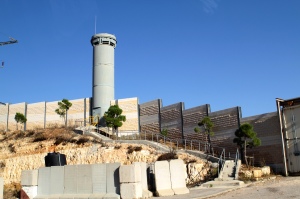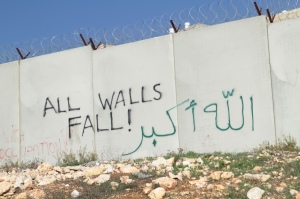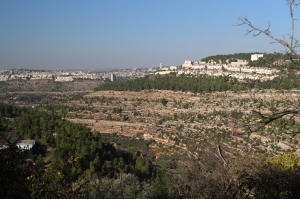Farewell to Gaza by Gerri Haynes, photos by Bob Haynes
This morning, we bid farewell to our friends in Gaza – hoping to see them again in April. Tonight, we are in Bethlehem – having taken a sobering tour of the areas around Bethlehem where land is being confiscated and freedom of movement for the Palestinians grows more and more restricted.
Yesterday morning, Maxine and I met with a group of women from Aisha, a women’s empowerment clinic. These clinics exist to serve the women of Gaza in many ways: psychological support, nutrition and exercise education, childcare education, promotion of skills for potential income generation. I asked the women to give us messages for the United States. These are their words…
Raneen: Thank God we are safe after the war. I live with my parents – they are my only things in my life.
Tell America: We are not enemies, but every time there is an election, they declare on war on us. That’s how they gain the popularity for an election.
Oifa: We live a very hard life. My house was damaged during wartime. I’m still living under very hard conditions. We want to end the internal problems. I came to Aisha to be helped. I have only one daughter – things are better since I’ve been coming to Aisha. I am learning needlework here.
Tell America: As long as bombing continues I am saying thank God we are safe. As long as we have God with us, we will always be the winners.
Futana abu Alra: I lived in very hard conditions during the war – I felt really bad – I had psychological problems and I came to Aisha to release the pain inside my heart.
Tell America: If America didn’t support Israel, the war wouldn’t happen.
Azhar: Thirty-three years old, divorced, four children (ages 6, 7, 9, 12). The children are with her husband. She is studying at the university and lives with seven people in two rooms. When she has finished university, she hopes to get a job and have her children with her. This war was the hardest of the three in the last six years. She says, “I used to live near Netzarim (where her children live) but now I live in Gaza City and couldn’t communicate with my children during the war. The ceasefire was a lie – I didn’t believe it – they bomb people – no one would allow me to see my children during the ceasefire. This was the first time I have ever seen dead bodies (Shatta area) – I was sick, psychologically depressed because I saw dead children. Things are easier since I came to Aisha – Aisha even served women during the war in mobile units. The war has had a huge impact – but we are a very strong people – despite the damage, we are sure we are the strongest people in the world and the Israelis are the weakest. They are strong with their guns, we are stronger with our personalities and our spirits. We had strong resistance and this made us feel stronger during the war.”
Tell America: “Our children whom you are always trying to kill are the ones who will free Palestine – no matter how many children you kill, our women will birth more and we will survive.”
Zeina Abdullah: mother of four children – two with autism. She and her four children live in one room with no doors and no windows. “You can’t imagine how much we suffered during the war. My 6-year-old autistic child was very scared during war. He kept shouting and screaming. I didn’t know what to do for him. I used to go to the doctor. They told me to keep hugging him. He was worse after the war. He was injured by the war. Whenever he heard the bombs, he ran. He fell on the stairs and was injured. Thanks to Aisha, I am in communication with Gaza Community Mental Health Programme and he will have his first visit tomorrow.”
Tell America: “We love peace and we love life – and we believe in peace. The living conditions in Gaza are very hard – I hope America will help to start rebuilding Gaza.”
Seraj: Mother of two children. “We suffered a lot during the war. Shrapnel and debris from the bombing of a neighbor injured my two-year-old.
Tell America: “We love peace and we need peace. No
matter what they do to Gaza there is something here that deserves living.”
Palestine: Divorced mother of four, ages 2 ½, 7, 9 and 11. She lives in the north of Gaza – the children live with her ex-husband in the south. They had no communication during the war and she lived with the really, really hard fear that they had died. Transportation is unaffordable so she doesn’t get to see them very often. Aisha helps her – she gets psychological support from Aisha.
Tell America: “No matter what America does to us, we are still the Holy Land – we are strong.”
Yusra: “I have lived in more than one war – the last war was the hardest – it hurt the people, the civilians, not the government. We want to live – we don’t want war
we want nothing to do with war. Israel is not respecting human rights. The last war, I suffered a lot – everyone was expecting to die, everyone wanted to die. Many people were displaced to hospitals and schools but this is not enough.”
Tell America: “They attacked us from the air and the land – where is the humanitarian law? There are no human rights in Gaza – we were out of water – even the air we breathe is poisonous.”
Rehab: “I was living during the war in two worlds Part of my family lives in Syria – they are in Yarmuk refugee camp. I was torn between here and there. During war I wouldn’t let my mother make a lot of food – I tried to make my family save food but we ran out of food. But even this was not like Syria where they ate animal food. I won’t feel happy until the people of Syria are also safe.”
Tell America: “They kill us with one hand and pretend to help us with the other. We want to live.”
Karam: 21-years-old. Completed grade 12. “I want a husband from America. Kidding – they are no better than Palestinian.” There are nine girls and three boys in her family. Her father is responsible for her married sisters. (unemployment in Gaza is 40% or more – and many people with jobs haven’t been paid for seven or eight months). Would like a job. The unity government didn’t fix anything. The psychological support provided by Aisha is very important – she is very happy here and has been taking training program with Germans for 10 days.
Tell America: “We are human beings, not animals or rocks – we love peace and we want to live.”
Ghadeer: 23-years-old – lives with parents – 14 people live in her house. Economic conditions are very hard and affect her a lot. She can draw – received training in art
wants to become an artist to help her family. Suffered a lot after the war – became more stressed – even with parents she was more nervous.
Tell America: “Despite the war, despite the siege, we are patient and will not give up.”
Lena: “You can’t imagine how hard this was – I saw martyrs for the first time.” In front of her house there were dead bodies of children – she is psychologically depressed and sad.
Tell America: “There have been enough wars – we are having enough of your wars.”
Shereen: 21-years-old – living in a house of three rooms holding 20 family members – doesn’t have a private room for herself and mother and two of her sisters – even her married brothers live in the same house. The economic conditions are very hard. She loves the most precious thing – her eye that was struck eight years ago and is now blind. Because there are 20 people in the same house, she doesn’t feel suitable in her own house. Is feeling really bad – always has a headache – receives psychological help at Aisha, but there is no medical treatment for her eye. She is not allowed to go outside and there is no freedom inside her house. Her father is dead and her brothers control the house. She is continuing her education in the university – but it is hard to study with one eye – wants to work in community service. Waits for morning to come so that she can come to Aisha. When she goes home
everything is worse. Cries every night with her sister.
Sleeps on the floor with children crawling on her body. When the war came, there was no room to hide in. Two missiles fell on her house.
Tell America: Hopes the world will help the Palestinians to improve their conditions. Wants to have freedom.
Rawan: 21-years-old – lives in a family of 14 members – during the war, severely impacted – house damaged, roof broken – water came in through the roof when it rained.
Running out of money – can’t rebuild the house. Thank god we are still alive. Comes to Aisha for relief of pain. “I hope to continue my education in order to benefit my community and country, but the economic condition don’t allow me to continue my education. Hope to find any kind of work to improve but no one is finding jobs.
Tell America: “I want to live like others do.”
Fida: 20-years-old. Like people in other countries, she dreams of stability and freedom. She also dreams of having a separate room for herself. She has no place to change her clothes – changes her clothes in the closet.
Tell America: “We need stability and freedom.”
Yasmeen: 29-years-old – lives in family of 12. “In our family, we are spending good time together – our living conditions were much better before the 1st Intifada – then worse and worse after the wars. What happened during the Eid – there was disaster in Shatta – Israel bombed 10 children. She hopes for improved living conditions, better economic conditions – she wants the borders open – she would like to visit the West Bank. She has been engaged for four years, but her husband-to-be lives in the West Bank and she cannot go out of Gaza.
Tell America: “Enough of wars – I hope to live in more stability and have more human rights like other countries do.”
Khlood: 19-years-old. Lives in a family of nine. During the war more thank 30 displaced people lived in her house. One of her aunts lost her home. Her Grandfather’s home was damaged. She relates that some people were scared, but she was not scared because this is usual. She experienced a shared experience: when they stop bombing, anxiety goes up – waiting for the bombing to resume.
Tell America: “Stop supporting war on Gaza. We want to live a normal life.”
5 Comments to “Farewell to Gaza by Gerri Haynes, photos by Bob Haynes”
RSS feed for comments on this post. TrackBack URI



By Susan Platt, November 10, 2014 @ 7:11 pm
Thank you for posting these statements. Futana abu Alra really got it right. If America didn’t support the wars, the wars wouldn’t happen.
Thank you for being there.
By Mohammed, November 10, 2014 @ 7:13 pm
Such a heart wrenching words and pictures from a place where I grew up and have not been able to visit for a while. My words are too little to express the gratitude of myself, family and people in Gaza who have been touched by your mercy and kindness and with your professional and expert knowledge. You guys came all the way to Gaza in its worst times after the war and you are able to see first hand the devastation that makes it almost unlivable. I came to the US many years ago for education and never made it back to where my family lives; however, your words and blog for the past few days had me live the experience of being there. I am too little and my words are too humble to give you enough thanks for this.
Cheers.
By Mark, November 12, 2014 @ 1:19 am
Thank you for the help you are giving the Palestinian people and publicizing their plight. the world needs more people willing to speak up and to help.
Mark
By Wahida Joosub, November 13, 2014 @ 7:15 am
God is never with the oppressor and it is obvious that those who are being oppressed have love for God. Who do you think will gain in the eternal life?
By Moon, November 14, 2014 @ 8:53 am
Thank you is too simple.
I wish more people would know what you have seen and experienced in Gaza,
Keep on letting the world know what is happening in Palestine. Keep on letting the world know who the Palestinians are.
Words are more important than weapons. Words can shape a new world, a new future for Palestine.